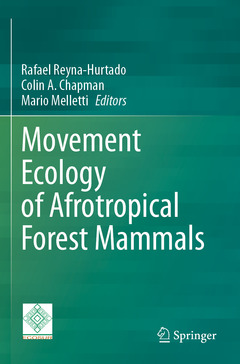Movement Ecology of Afrotropical Forest Mammals, 2023
Coordonnateurs : Reyna-Hurtado Rafael, Chapman Colin A., Melletti Mario

Rafael Reyna-Hurtado is a Mexican biologist that has studied tropical ungulates since 1997 in Mesoamerica and Uganda. Rafael obtained a Master degree and PhD degree in Wildlife Ecology and Conservation in University of Florida, USA. He also conducted a three years postdoctoral study in McGill University, Montreal, Canada with focus in East African terrestrial forest mammals. Rafael has focused his research on movement ecology of social species, particularly the white-lipped peccary in the Calakmul forest of Mexico and the giant forest hog in Kibale National Park, Uganda. Rafael is a professor of El Colegio de la Frontera Sur in Campeche city, Southern Mexico where he has formed a team of highly qualified students that are conducting studies in movement patterns of tropical ungulates in all Mesoamerica.
Colin Chapman is a Canadian Biologist who has worked in the tropics for over 40 years and has applied his research to conservation. Colin received hisjoint Ph.D. in the Departments of Anthropology and Zoology at the University of Alberta. He spent 2 years at McGill and 3 years at Harvard University doing post-doctoral research. Since 1990 he has served as an Honourary lecturer in the Department of Zoology at Makerere University, Uganda and since 1995 he has been a Conservation Fellow with the Wildlife Conservation Society. Colin also served as a faculty member in Zoology at the University of Florida for 11 years and returned to McGill in 2004 where he held a Canada Research Chair Tier 1 position in Primate Ecology and Conservation, in 2019 move to George Washington University to allow him to spend more time on conservation and then in 2022 he shifted to Vancouver Island University to facilitate his work on the board of African Wildlife Foundation (Canada). He is a Wilson Center Fellow, Killam Research Fellow, Velan Foundation Awardee for Humanitarian Service, and is a fellow of the Royal Society of Canada. In 2018 he was
Date de parution : 04-2024
Ouvrage de 196 p.
15.5x23.5 cm
Date de parution : 04-2023
Ouvrage de 196 p.
15.5x23.5 cm



